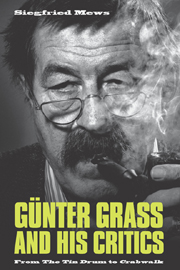Book contents
- Frontmatter
- Contents
- List of Abbreviations
- Introduction
- Part 1 Danzig, Center of the Universe
- Part 2 From Danzig to the Global Stage: Grass's Fiction of the 1970s and 1980s
- Part 3 After Reunification: Old Problems and New Beginnings
- 12 Unkenrufe / The Call of the Toad
- 13 Ein weites Feld / Too Far Afield
- 14 Mein Jahrhundert / My Century
- 15 Im Krebsgang / Crabwalk
- Epilogue
- Works Cited
- Index
12 - Unkenrufe / The Call of the Toad
from Part 3 - After Reunification: Old Problems and New Beginnings
Published online by Cambridge University Press: 05 February 2013
- Frontmatter
- Contents
- List of Abbreviations
- Introduction
- Part 1 Danzig, Center of the Universe
- Part 2 From Danzig to the Global Stage: Grass's Fiction of the 1970s and 1980s
- Part 3 After Reunification: Old Problems and New Beginnings
- 12 Unkenrufe / The Call of the Toad
- 13 Ein weites Feld / Too Far Afield
- 14 Mein Jahrhundert / My Century
- 15 Im Krebsgang / Crabwalk
- Epilogue
- Works Cited
- Index
Summary
The Return of the Dead
ALITTLE OVER A YEAR AFTER the publication of Zunge zeigen (1988), momentous historical events took place in Germany: the opening of the Berlin Wall in November 1989, subsequent German (re)unification in October 1990, and the dissolution of the Soviet Union and the Eastern Bloc. Grass, who since the 1960s had addressed various aspects of the “German question” in speeches, essays, and public debates, emerged — in contrast, for example, to his friend and mentor Willy Brandt (1913–1992), former Chancellor of the Federal Republic — as a prominent intellectual opponent of reunification and vigorous advocate of a confederation of the two German states, which was supposed to be based on the concept of the Kulturnation, or nation bound together by its cultural heritage rather than united within a nation state defined by a boundary setting it apart from other nation states. Not unexpectedly, Grass's uncompromising stance against reunification, which is reflected in some of the essays assembled in his Two States — One Nation (1990), elicited widespread censure, which in the beginning was fueled by the euphoria (which eventually subsided) generated by the prospect of a reunited nation and the ensuing reestablishment of one German state.
Unkenrufe, which officially went on sale at the beginning of May 1992, had been energetically promoted by the writer's new publishing company, Steidl in Göttingen, months before the book became generally available (see Arnold 1997, 188).
- Type
- Chapter
- Information
- Günter Grass and his CriticsFrom 'The Tin Drum' to 'Crabwalk', pp. 249 - 263Publisher: Boydell & BrewerPrint publication year: 2008



